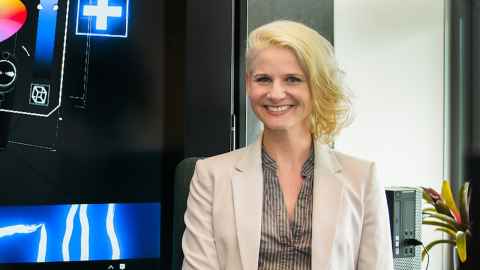Dissolving the interface between humans and computers
20 April 2021
For many people, it’s become impossible to imagine life without a smartphone.

We’re so used to keeping them close and checking them constantly without thinking they can be seen as permanent attachments to our bodies - or permanently attached burdens.
Technologies beyond the smartphone that blur the boundaries between the human body and computers are becoming more commonplace, and are merging our work, social, personal and cultural identities.
Immersive virtual reality is widespread, and seamless augmented reality seems imminent. There are also signs that full brain-computer interfaces are making their way from science fiction into reality.
Have we reached the pinnacle of these human-computer technologies? Is there more functionality or benefit we can gain? And how will they impact our wellbeing and community cohesion?
Our 2021 Gibbons Lecture Series will examine the latest technologies connecting humans and computers; the ways they are developed, new innovations on the horizon, and how they could be used to connect ourselves to wellbeing, diversity and culture.
There are four lectures in the Series, all will be held in B10 Lecture Theatre, General Library Basement ((109-B10) at 5 Alfred Street. Each lecture begins at 6.00pm and light refreshments will be served from 7pm. This series is open to the public and all are welcome, registration appreciated.
Lecture 1 on 6 May: Associate Professor Tobias Langlotz, Augmented Reality: Augmented Paintings to Augmented Perception. This lecture deals with current research and emerging opportunities in the field of continuous augmentations and augmented perceptions.
Lecture 2 on 13 May: Potaua Biasiny-Tule, founding director at Digital Basecamp in Rotorua, presents her lecture, Tikanga AI: Enabling Mātauranga Māori in the future of AI development within Aotearoa New Zealand.
Lecture 3 on 20 May: Dr Danielle Lottridge presents Digital Wellbeing: from Human Factors to Mixed Reality Rehab. The lecture will discuss how our everyday digital use changes us and how social platforms shape our relationships and digital interactions.
The final lecture is on 27 May and is from Associate Professor Suranga Nanayakkara from the Auckland Bioengineering Institute. His lecture, titled Assistive Augmentations: Creating new Human Computer Interfaces that Seamlessly Integrate with our Body, Mind and Behaviour, looks at insights provided from physiology, neuroscience, emerging electronic devices, computational methods and design thinking.
Media contact
Anne Beston | Media adviser
DDI 09 923 3258
Mob 021 970 089
Email a.beston@auckland.ac.nz